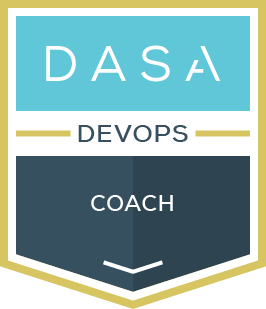Introduction
In the ever-evolving era of digital transformation, DevOps has emerged as a critical enabler for organizations striving to deliver high-quality software with enhanced speed and efficiency. As enterprises increasingly embrace DevOps methodologies, the demand for proficient DevOps coaches has witnessed a significant surge.
This knowledge session provides a comprehensive guide for individuals aspiring to embark on a fulfilling career in DevOps coaching. It aims to demystify the concept of DevOps coaching while offering valuable insights into the essential skills, experiences, and mindset required to excel in this role. It emphasizes that a successful DevOps coach must navigate beyond technical proficiency alone. While technical expertise holds its place, equal, if not greater, importance is placed on soft skills, adaptability, continuous learning, and a profound understanding of the organization’s business needs.
Ultimately, the role of a DevOps coach extends beyond technical guidance, encompassing the ability to navigate complexities, nurture talent, and cultivate a culture of continuous improvement and innovation.
Embracing the DevOps Philosophy: More than Tools and Practices
The empowerment that DevOps provides extends far beyond mere tools and methodologies; it signifies a deep-seated shift in corporate culture. It highlights the importance of collaboration, communication, and constant advancement between development and operations teams. Successfully driving this metamorphosis necessitates coaches who are deeply versed in these guiding principles. By transcending conventional departmental boundaries and encouraging symbiotic workflows, they can genuinely internalize the DevOps philosophy and unlock its immense potential.
The Power of Communication and Facilitation Skills in DevOps Coaching
In the role of a bridge between teams, individuals, and stakeholders, a DevOps coach needs to have exceptional communication and facilitation skills. Essential to their toolkit are traits like active listening, empathy, and the flexibility to adapt communication styles to different audiences. These skills help to convey ideas effectively, align expectations, and foster a culture of collaboration, enabling teams to achieve shared objectives seamlessly.
Success in DevOps Coaching: Beyond Technical Backgrounds
A technical background is not always a prerequisite for excelling as a DevOps coach. While technical proficiency can be advantageous, the key factors that truly matter are the willingness to learn, adapt, and lead teams through the DevOps journey. A coach should balance various roles– a leader, mentor, facilitator; according to the needs of the team. Sometimes the progress has to be driven; other times, step back, empowering others with space, skills, and guidance. This dynamic role involves continuous self-reflection and adjustment. This holistic approach to coaching aptly illustrates the diverse skills and adaptive mindset necessary to excel in the role.
During the session, the experience of Antoni Tzavelas was highlighted as an example. Despite having a background in the fashion industry, Antoni successfully transitioned into a DevOps coaching role by leveraging his leadership skills, effective communication facilitation, and unwavering dedication to continuous learning. This remarkable journey exemplifies how diverse backgrounds can bring forth unique perspectives and strengths, enriching the field of DevOps coaching.
Fostering Trust and Commitment: The Pillars of DevOps Coaching
DevOps coaching extends beyond mere technical expertise, requiring a strong, trust-based relationship between the coach and the team. This trust is built when the coach demonstrates a genuine stake in the team’s success, showing their ‘skin in the game’. Rather than simply ticking boxes, a successful coach invests in shared objectives, cultivating a collaborative culture that propels collective goals and continuous innovation. While technical understanding remains crucial, this ‘skin in the game’ approach emphasizes a deeper, relationship-centric facet of coaching, which is pivotal in the complex DevOps landscape.
The Significance of Coaching and Facilitation Skills in DevOps
DevOps coaching is as much about human interaction as it is about technical guidance. It involves guiding teams, facilitating discussions, and driving change, all of which demand a certain level of skill. Therefore, those looking to succeed in this field must focus on developing robust coaching and facilitation skills. These include active listening, effective communication, conflict resolution, and abilities in motivating teams. These skills enable a coach to nurture a productive and harmonious environment where continuous improvement thrives.
The Role of Certifications and Training in Advancing a DevOps Coaching Career
Certifications and training play a pivotal role in the professional journey of a DevOps coach. Pursuing relevant credentials, such as the DASA DevOps Coach certification, not only adds credibility but also underscores one’s commitment to professional growth. It validates a coach’s understanding of DevOps methodologies, practices, and coaching techniques, thereby boosting their reputation and trustworthiness in the field. This knowledge can be applied in real project scenarios to enhance the efficacy of DevOps practices within an organization. The coach can effectively guide teams using these methodologies, optimize operational processes, and help resolve any roadblocks that may arise in the implementation of DevOps, thereby delivering the full benefit of their training in the field.
Versatility and Adaptability: The Essence of DevOps Coaching
DevOps coaching integrates elements from a variety of roles, including Scrum Master and Agile Leader, providing a practical foundation for effective coaching. Gaining first-hand experience in these roles equips a coach with a tangible stake in the process. This comprehensive approach further incorporates aspects such as culture, automation, lean measurement, and sharing, synergizing elements of Scrum, lean methodologies, cloud infrastructure, and automation metrics in a goal-oriented manner. The true hallmark of a DevOps coach, however, lies in their ability to adapt and shift roles based on the team’s maturity and the environment, a flexibility that underscores their leadership and contributes significantly to efficient development operations.
Starting Small: The Strategy for Early Success in DevOps Coaching
Taking a phased approach to DevOps coaching can optimize its efficacy and facilitate successful implementation. By focusing initially on smaller teams or projects within the organization, coaches can showcase their skills, experiment with various methodologies, and establish a track record of achievements. As they progressively expand the scope of coaching, leveraging the accumulated experience and credibility, they effectively drive transformative changes across the organization. This strategic approach ensures tangible results, fostering a culture of continuous improvement in DevOps.
Antoni Tzavelas suggested reading The DevOps Handbook by Gene Kim, Jez Humble, Patrick Debois an John Willis; and The Phoenix Project by Gene Kim, Kevin Behr and George Spafford–invaluable guides for those in or entering DevOps, and agile practitioners aspiring to perfect their craft.
The Imperative of Continuous Learning in the Evolving DevOps Landscape
In the rapidly evolving DevOps landscape, continuous learning isn’t just beneficial; it’s an absolute necessity. Staying updated with the latest trends, tools, and practices is crucial for maintaining relevance and effectiveness as a coach. This involves investing time and effort in reading, attending webinars, enrolling in online courses, and participating in relevant communities. Embracing a mindset of lifelong learning is, therefore, key to navigating the shifting tides of DevOps.
From Chaos to Cohesion: How DevOps Coaches Lead Organizational Change and Cultural Shifts
Significant organizational and cultural changes often accompany the implementation of DevOps. In this regard, a DevOps coach should possess strong change management skills to help teams and organizations navigate these changes successfully. Furthermore, they should exhibit leadership qualities that inspire and empower teams to embrace DevOps principles and practices, thus driving forward the transformation process.
Aligning DevOps Practices with Business Goals: A Core Responsibility
A successful DevOps coach understands and acknowledges the importance of aligning DevOps practices with business goals. By bridging the gap between technical tasks and business objectives, a coach ensures that the implementation of DevOps methodologies drives operational efficiency and customer satisfaction. This alignment of technical strategies with business requirements is a vital factor in realizing the full benefits of DevOps transformation.
Embracing Experimenting as a Learning Opportunity: The DevOps Perspective
One of the key principles emphasized in DevOps is the significance of perceiving failure as a valuable learning opportunity rather than a setback. Within the DevOps world, failure is seen as a means to gain insights, identify areas for improvement, and refine practices. A successful DevOps coach understands and promotes this perspective, encouraging teams to embrace a ‘fail-fast, learn faster’ mindset. By fostering a culture that values resilience and continuous improvement, DevOps coaches help teams to view failures as stepping stones toward success and innovation.
Bespoke Over Generic: Avoiding the One-size-fits-all Approach in DevOps Coaching
Every organization has unique needs and challenges, and a successful DevOps coach recognizes this. The knowledge session cautioned against adopting a one-size-fits-all approach, emphasizing the need for bespoke strategies that align with the specific requirements of an organization. By understanding the unique dynamics of each team and organization, a coach can devise tailored approaches that drive effective and sustainable DevOps transformation.
Conclusion
As the world navigates the complex maze of digital transformation, the rise of DevOps has ushered in a wave of innovation, collaboration, and efficiency. Amid this shift, the role of a DevOps coach has become increasingly pertinent, demanding a unique blend of skills and qualities that go beyond mere technical prowess. The essence of DevOps coaching lies in fostering a culture of continuous learning and improvement, catalyzing synergistic workflows, and infusing the principles of collaboration, communication, and adaptability into the organizational DNA.
With certifications and continuous learning as significant enablers, DevOps coaching requires a commitment to professional growth. And while the path is demanding, the rewards, in terms of career fulfillment and organizational impact, are undoubtedly compelling.
As we look to the future, one thing is clear–the role of a DevOps coach will continue to evolve, bringing new challenges, opportunities, and learning experiences. As we embrace this evolution, let’s celebrate the rich tapestry of skills, experiences, and perspectives that make DevOps coaching an instrumental force in our digital age. It is important to remember that at the heart of DevOps coaching lies the fundamental truth that people, their interactions, and their growth are the critical drivers of transformation and success.
Watch the ‘Kick-start your DevOps Coaching Career: Lessons and Pitfalls‘ episode.


DASA DevOps Coach
This three-day course is for individuals aspiring to guide teams and organizations through the complexities of DevOps transformations.
